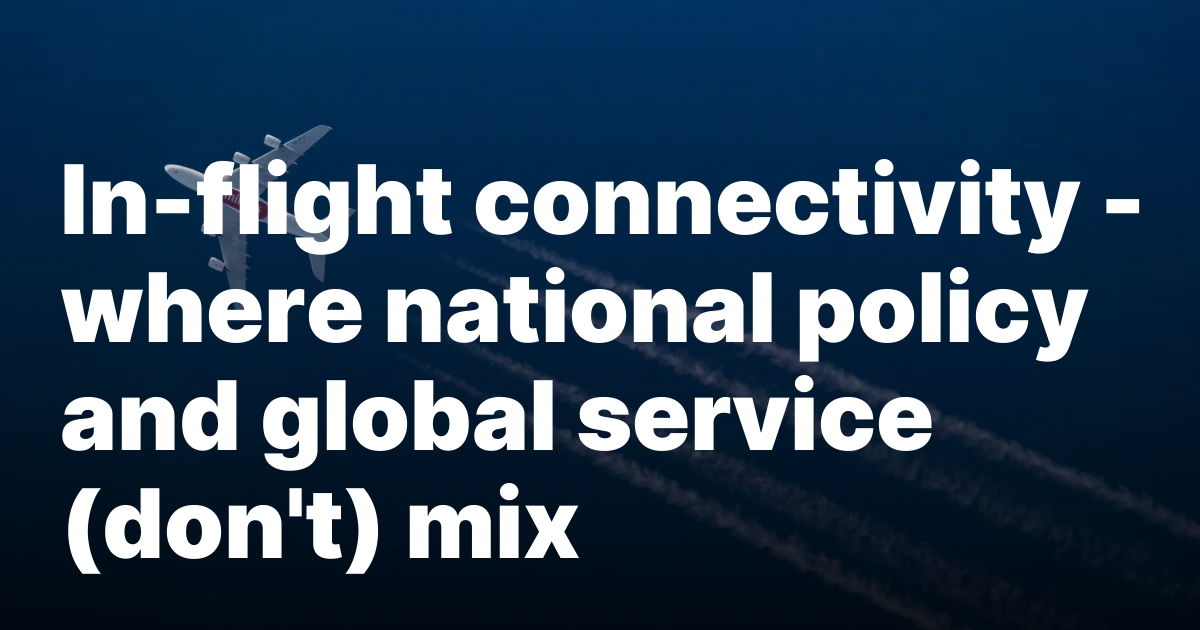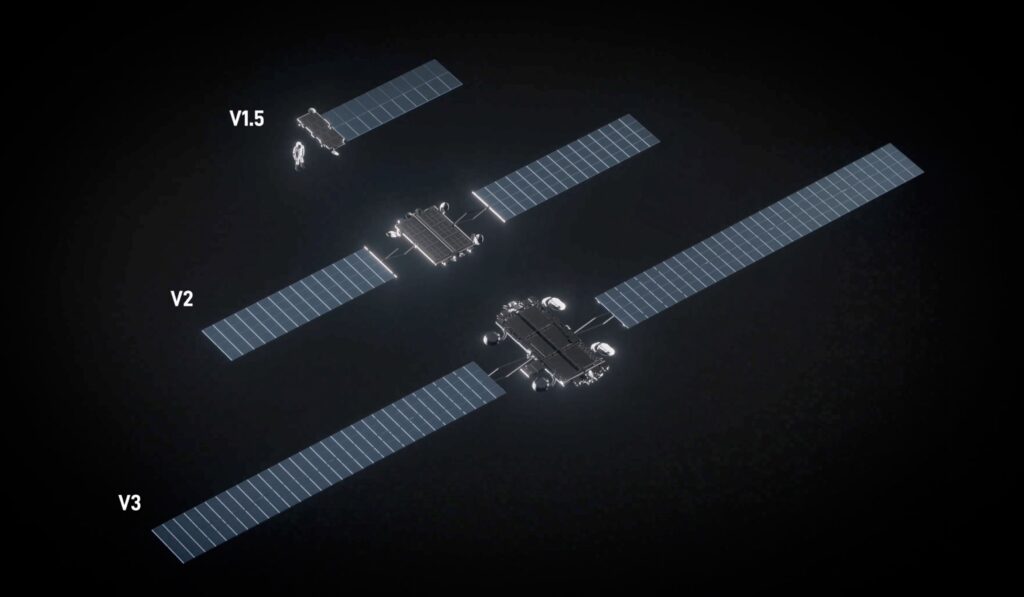Now Reading: In-flight connectivity – where national policy and global service (don’t) mix
-
01
In-flight connectivity – where national policy and global service (don’t) mix
In-flight connectivity – where national policy and global service (don’t) mix

An increase in the demand for better in-flight connectivity is inevitable: people don’t want to be incommunicado anymore when they travel. The in-flight connectivity (IFC) market is transitioning from niche to a relevant revenue vertical for satellite companies. And, lately, satellite operators have been silently — but ferociously — competing for new business.
The biggest disruptor in the satellite industry — Starlink — has won new contracts with big airlines, while legacy operators have been building partnerships to counter Elon Musk’s business. Meanwhile, half the industry has apparently become resellers of OneWeb’s new available capacity and is looking to offer IFC in multiple jurisdictions.
So suddenly, national telecommunications regulators across the world have been dealing with dozens of new requests from every satellite operator to obtain a permit to provide IFC within their territory. But in order to support a competitive landscape — and improve IFC access globally, the licensing processes for IFC providers must be overhauled.
The International Telecommunications Union has been harmonizing frequencies and spectrum rules for this type of service, but licensing is a different story. From a national regulator’s point of view, granting permission for a satellite operator to provide in-flight connectivity services on a foreign aircraft simply flying through their airspace is one thing, but it’s a different story altogether if the airplane in question is registered in their territory. And here is where regulations mess with competition.
Today, to authorize a satellite operator as the in-flight connectivity provider for a national airline, many regulators require that operator to become a telecommunications provider in the country — almost as if it were providing telecommunications services to the general population.
This creates many obligations, the worst being the requirement for a local entity — a bureaucratic nightmare. Foreign ownership restrictions are common, and local lawyers are needed for paperwork and taxes. In some jurisdictions, lawful interception may be impossible for foreign satellite providers, particularly if they count Western armies as clients, as compliance could pose a security risk. Additionally, radio equipment may require type approval from local authorities that don’t recognize equivalent permits from other jurisdictions.
IFC is a perfect example of how obsolete regulatory frameworks create inequities in global access to a service. For example, passengers in Europe benefit from lower prices because the EU framework is simple and inexpensive, allowing airlines on the continent to choose their IFC provider from almost any satellite operator in the world. Passengers in the United States may also benefit, as they live in a country with many local operators competing under the same rules.
However, if you are a citizen of one of the many countries around the world where IFC rules are neither modern nor reasonable, then you’re probably condemned to pay higher prices — or receive a bad service. National airlines have limited opportunities to find a good IFC provider outside the very few that can comply with the local regulatory requirements. In the Middle East, for example, satellite companies must “partner” with local entities and comply with tough lawful intercept mandates to operate — or forgo the market entirely. In Latin America, most countries enforce registration as a local telecom provider, with one even requiring a Presidential decree. Things are no better in the Asia Pacific, where Singapore restricts access to popular satellite bands and China’s stringent rules basically exclude foreign providers.
Unfortunately, many national authorities are now following this trend, viewing foreign satellite providers as an intrusion and a threat to national sovereignty. Lately, every big geopolitical power wants to have their own satellite constellation and rely as little as possible on foreign ones. The next World Radio Conference may support this damaging shift. Under Agenda Item 1.5, the ITU is studying new measures to block satellite terminals in territories where a satellite operator has no license — something that could create collateral damage to satellite emergency services and IFC.
Nevertheless, there is still some hope for IFC. If governments want to be tough on foreign satellite operators without damaging IFC services, they must differentiate between satellite communications within their territories and connectivity services offered on board aircraft — developing a separate light-touch regime for IFC. After all, this is not a service provided to the general public but to a handful of passengers 30,000 feet in the air.
So, what would such a light-touch regime look like? Firstly, foreign-registered aircraft should not require any kind of additional permit, as per Article 30 of the Chicago Convention. For domestically-registered aircraft, national regulators should allow foreign operators to provide IFC without establishing a local branch, recognizing that satellite services are inherently global and operators cannot set up entities in every country. Additionally, landing rights and local gateways should not be mandated, as IFC does not constitute permanent communications inside a territory. Instead, we should be looking at a simple, ad hoc licensing procedure; a so-called blanket license approach where the number of airplanes have no bearing on the type or process, as that makes no difference from a licensing perspective. Type approval from recognized foreign agencies should also be accepted. If jurisdictions adopt this approach, national carriers will find that they can suddenly choose from a pool of 30 IFC providers, instead of just two or three, and passengers’ access to the internet would receive a boost, globally.
Modernizing IFC regulations is not just about fairness for airlines — it’s about ensuring reliable access to affordable connectivity for passengers globally. In a world where connectivity is no longer a luxury but an expectation, outdated rules must not be the reason why some passengers stay disconnected.
Juan Cacace is Access Partnership’s Director of Government Affairs, Space and Connectivity Lead. Juan gains market access for new technologies worldwide by helping companies to comply with regulations as well as obtain licenses and permits for their products and services.
SpaceNews is committed to publishing our community’s diverse perspectives. Whether you’re an academic, executive, engineer or even just a concerned citizen of the cosmos, send your arguments and viewpoints to opinion@spacenews.com to be considered for publication online or in our next magazine. The perspectives shared in these op-eds are solely those of the authors.
Stay Informed With the Latest & Most Important News
-
 01From Polymerization-Enabled Folding and Assembly to Chemical Evolution: Key Processes for Emergence of Functional Polymers in the Origin of Life
01From Polymerization-Enabled Folding and Assembly to Chemical Evolution: Key Processes for Emergence of Functional Polymers in the Origin of Life -
 02Two Black Holes Observed Circling Each Other for the First Time
02Two Black Holes Observed Circling Each Other for the First Time -
 03How New NASA, India Earth Satellite NISAR Will See Earth
03How New NASA, India Earth Satellite NISAR Will See Earth -
 04Thermodynamic Constraints On The Citric Acid Cycle And Related Reactions In Ocean World Interiors
04Thermodynamic Constraints On The Citric Acid Cycle And Related Reactions In Ocean World Interiors -
 05Φsat-2 begins science phase for AI Earth images
05Φsat-2 begins science phase for AI Earth images -
 06Hurricane forecasters are losing 3 key satellites ahead of peak storm season − a meteorologist explains why it matters
06Hurricane forecasters are losing 3 key satellites ahead of peak storm season − a meteorologist explains why it matters -
 07Binary star systems are complex astronomical objects − a new AI approach could pin down their properties quickly
07Binary star systems are complex astronomical objects − a new AI approach could pin down their properties quickly




















